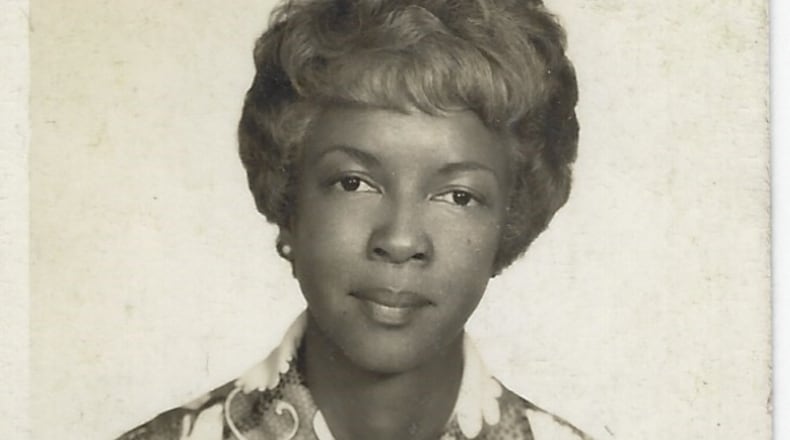Born to a school teacher and a Jamaican dental technician in New York City in 1920, Irma “Pete” Cameron Dryden planned to become a physician, but opted for nursing because the medical school was full. It was fortuitous, cementing her place in history as a Tuskegee Airmen nurse and as a woman who opened doors for others.
“She was aware the bravery she showed in the 1940s — going into the Jim Crow South as a woman of color, to take care of other people — still gives confidence today to others working to reach their goals,” said daughter-in-law Maggie Williams Dryden.
Second Lt. Irma Dryden was one of the last living Tuskegee Airmen nurses when she died Sept. 17 at her home in Canton, Ga. She was 100. Hanley-Shelton Funeral Directors in Marietta is handling arrangements. A live-streamed memorial service is planned for November.
Her ashes will be interred at Arlington National Cemetery in Arlington, Va.
Credit: Courtesy of the family
Credit: Courtesy of the family
Dryden boarded a train for Tuskegee Airfield in Alabama soon after graduating Harlem Hospital School of Nursing in 1942. Unaccustomed to discrimination and prejudice, she was stunned by train rules that Blacks were to eat after whites, and behind a curtain.
“I didn’t eat the whole trip,” she said in an interview with Tuskegee University, on her 100th birthday in May.
She served at the Tuskegee Army Airfield station hospital, caring for World War II pilot cadets in training. Of the 50,000 U.S. Army Nurse Corps nurses who served in the war, fewer than 600 were Black, and only 28 were stationed at Tuskegee Airfield, according to Pia Jordan, director of the Tuskegee Army Nurses Project.
With the U.S. military segregated, the period was painful for Dryden and others in the Tuskegee Airman corps. They faced resistance at home and at war.
“Not only were they fighting Hitler, they were fighting segregation and discrimination in their own country,” said Jordan.
Irma Dryden had numerous run-ins with racism during her time at Tuskegee. When she purchased cosmetics at a store near the airfield, a sales clerk threw Dryden’s change at her. Dryden told the clerk to keep the money for etiquette lessons.
Irma Dryden said her mother was concerned for her safety in the Deep South, but the young nurse took a measured approach to discrimination. “The calm and understated tone she did it with was inspiring,” said Maggie Dryden.
In the interview with Tuskegee University, Irma Dryden described the focus behind her resolve.
“I’m proud of the fact I was able to withstand the feelings I had to make sure the young men got the care and attention they needed … We knew we were going to overcome the prejudices and all we were faced with.”
That perseverance led to lasting change.
“The fact that Irma and the other nurses performed in such a professional way established the foundation for (President Harry) Truman to sign the order to desegregate the military in 1948, and for other Black nurses to join the military,” said Jordan.
While working at the hospital, Dryden fell in love with Tuskegee Airman Charles Dryden. Their 1943 wedding was the first at Tuskegee Airfield, and their love story was featured in Tom Brokaw’s book, “An Album of Memories: Personal Histories from the Greatest Generation.” After 32 years of marriage, Irma and Charles Dryden divorced, but remained friends until his death in 2008.
The couple raised three sons, stressing education, patriotism, hard work and excellence, said son Charles Walter “Chaz” Dryden Jr.
“With the Tuskegee Airmen, my parents had to overcome the conclusion that Black people didn’t have what it took to do more than menial jobs. They had to not only meet the bar, but exceed it. That trickled down to us kids. So, we were taught to always strive for excellence — average wasn’t good.”
After her service, Irma Dryden helped start a New Jersey-based medical lab which she oversaw for more than 20 years. She moved to Georgia nine years ago to be closer to family. She was a familiar face at Atlanta area schools, where she frequently read books to elementary and middle schoolers.
“She left a powerful mark on humanity. I think that’s what everyone would want to do,” said Maggie Dryden.
Dryden was preceded in death by son Eric Buckley Dryden. Survivors include sons Keith Dryden of Canton, and Charles Walter “Chaz” Dryden Jr. of Maui; daughter-in-law Maggie Williams Dryden of Marietta; grandchildren Cameron Dryden of Williamsburg, Va., and Tyler Dryden and Isabella Dryden, both of Marietta; and great-grandchild Alpha Jackson Dryden of Williamsburg.
Inquiries regarding memorials may be emailed to drydenfund@gmail.com.
About the Author
The Latest
Featured



